In last Tuesday’s post (Twosday), Sofia mentioned that Barn Kitty has returned to the sanctuary.
For those of you who may not be aware, Barn Kitty (“B.K.”) is a free-ranging domestic cat that prowls the patchwork landscape surrounding the Chimp House. It’s believed he divides his time between the sanctuary property and the neighboring ranch, but we have no way of monitoring his whereabouts in real time. We don’t even know with certainty whether Barn Kitty is a true feral (born and raised apart from humans), a homeless stray, or just a particularly independent outdoor “barn cat” from next door. Sometimes, he disappears for months at a time before casually returning. He’s a mysterious lad.
I absolutely love living with cats (and can’t imagine the internet without them), but the existence of stray and feral cats is problematic for various reasons.
For one thing, the historical relationship between humans and house cats is mutually beneficial but not codependent. In many ways, this species was never fully domesticated and differs only slightly from its African wildcat ancestor. Importantly, cats all remain adept hunters and prolific breeders regardless of whether we supplement their diets or not. This self-reliance allows them to subsist indefinitely without much assistance from humans (besides the occasional voyage across an ocean or piggy-back ride across national borders).
The unfortunate loser in this transaction is biodiversity. Many native species, especially birds and small mammals, cannot reproduce fast enough to compensate for the addition of a new predator on the landscape. A 2013 study by Smithsonian researchers estimated that house cats kill billions of wild animals annually in the U.S. alone and individual cats have been observed to kill hundreds of birds and rodents in a single year. Their effect is especially devastating on islands where native species haven’t adapted defenses against land predators and there are no larger carnivores to keep the newcomers in check. This isn’t to say that domestic felines are objectively bad– ecosystems are constantly in flux and most species will do what they can to exploit available niches- but their spread has definitely had a substantial impact on fragile ecosystems during a massive extinction crisis.
A second problem with domestic cats living outdoors is that they’re susceptible to a plethora of factors that can negatively impact their own welfare. In places where native predators such as coyotes and cougars exist, house cats often become a widespread and easy meal. Free-ranging cats are also at risk of accidents such as vehicle collisions and rarely have access to veterinary care when sick or injured, shortening their average lifespan. Without routine vaccinations, feral cats are also largely responsible for the spread of infectious diseases such as FIV.
Of course, a counterargument can be made that feral cats are relieved from the constraints of living in a human home and don’t suffer from the complications of a captive lifestyle: boredom, artificial diets, separation anxiety, overfeeding, etc. While many stray cats can happily return to indoor living, ferals tend to remain fearful of humans for their entire lives.
In areas where free-ranging cats have grown to be particularly bothersome, veterinary professionals will often work with wildlife agencies to curb their impacts. The simplest method of control- culling them outright- is ecologically effective but understandably controversial. Fortunately, less drastic interventions (e.g. trap-neuter-release programs) can yield long-term results while remaining palatable to the general public. The cats can keep living outdoors and hunting, but they lose the ability to reproduce and eventually disappear from the landscape.
In B.K.’s case, we decided long ago that he is welcome here at the sanctuary with one stipulation: that he doesn’t sire any more tuxedo’ed killing machines. Last year, Dr. Erin and Sofia made this official by neutering him while tending to a concerning leg injury. B.K. made a full recovery and, despite being more wary of us, seems to spend just as much time hanging around our barn as he did before. It’s not uncommon to see him lounging on a sun-drenched patch of grass or stalking mice in the nearby thickets. With reliable access to shelter, cover, food, water, and health care, one could argue that Barn Kitty is better off than most free-ranging cats
Caring for animals requires a never-ending series of compromises; the most tenable policies and effective solutions are usually those that balance compassion and logic. I like to think that we’ve found something like that for the furry enigma that we call Barn Kitty.
~~~~~~~~~~~~~~~~~~~~~~~~~~~~~~~~~
P.S. Yesterday, B.K. followed me back and forth around the hay barn as I did chores, so I risked my skin to take some closeups for you all to enjoy.
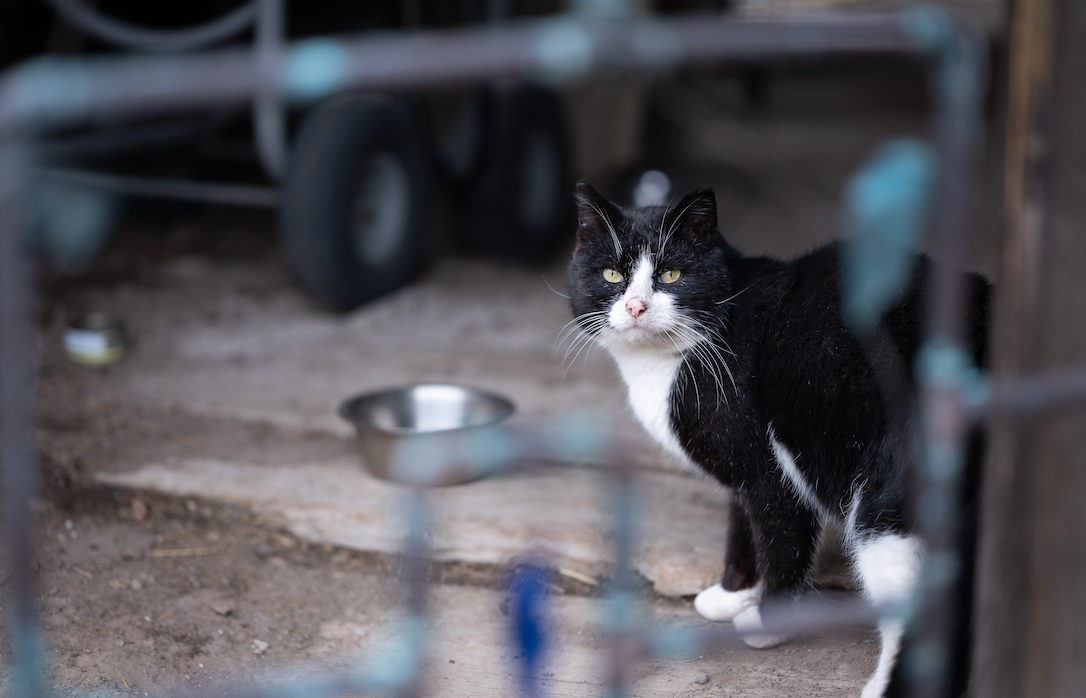
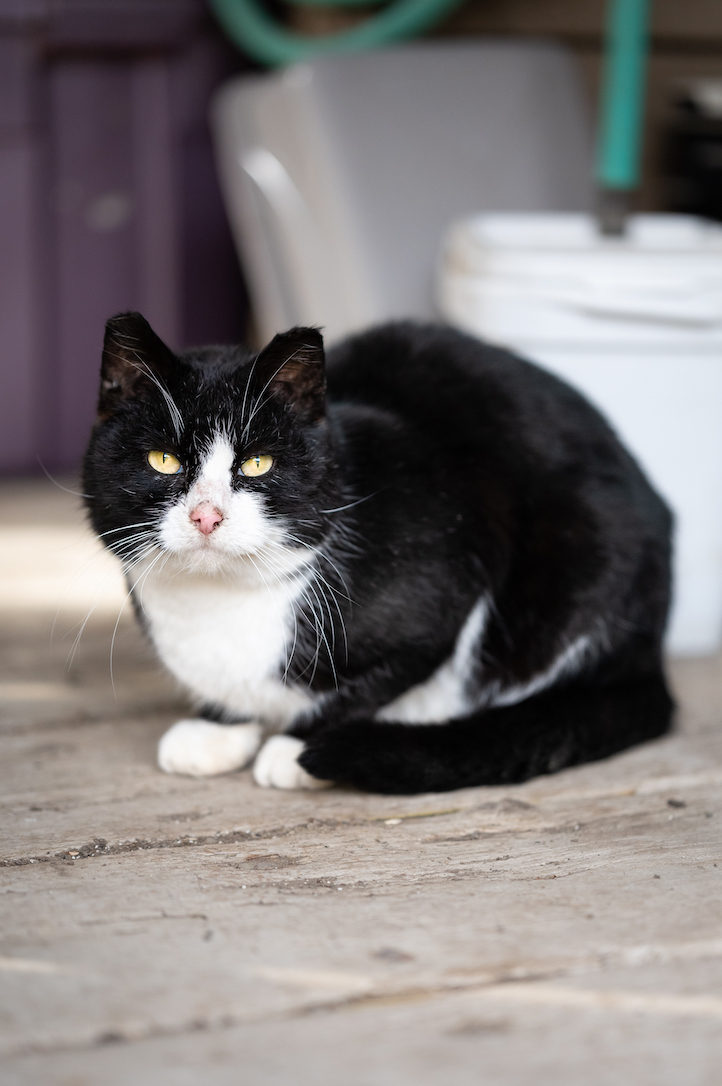
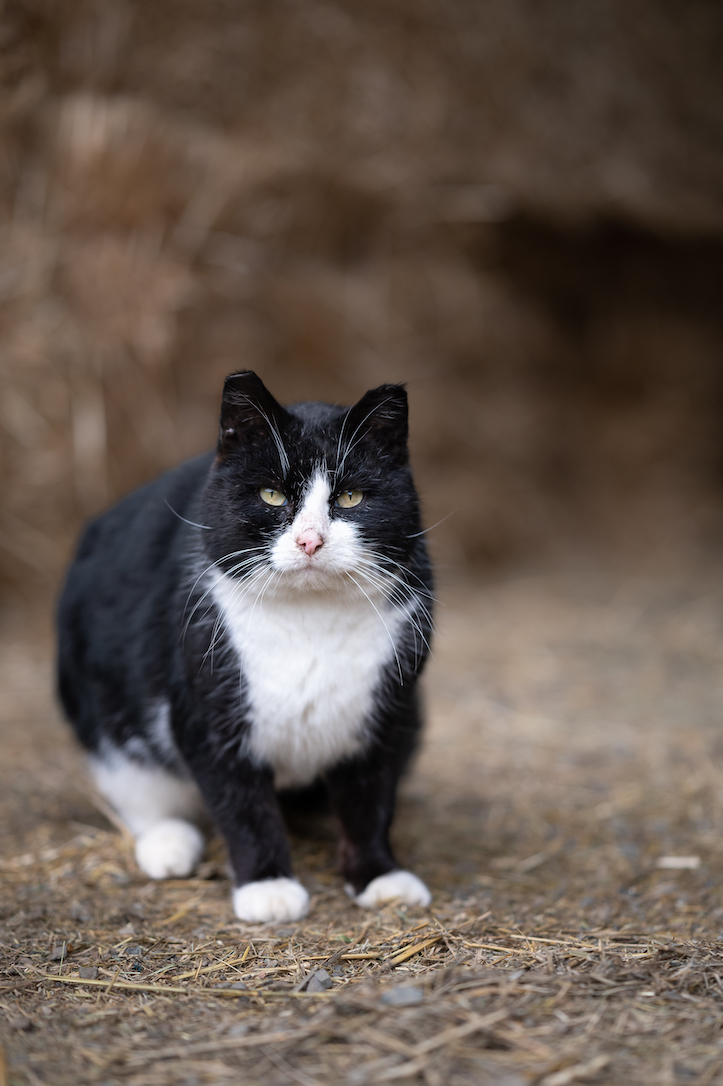
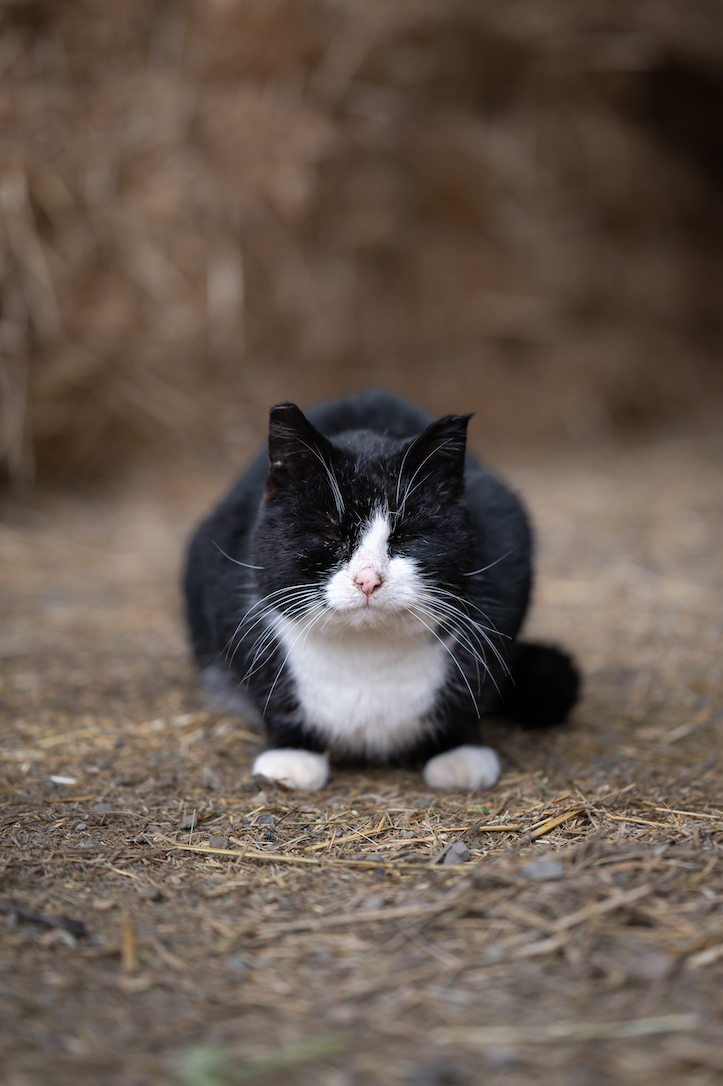
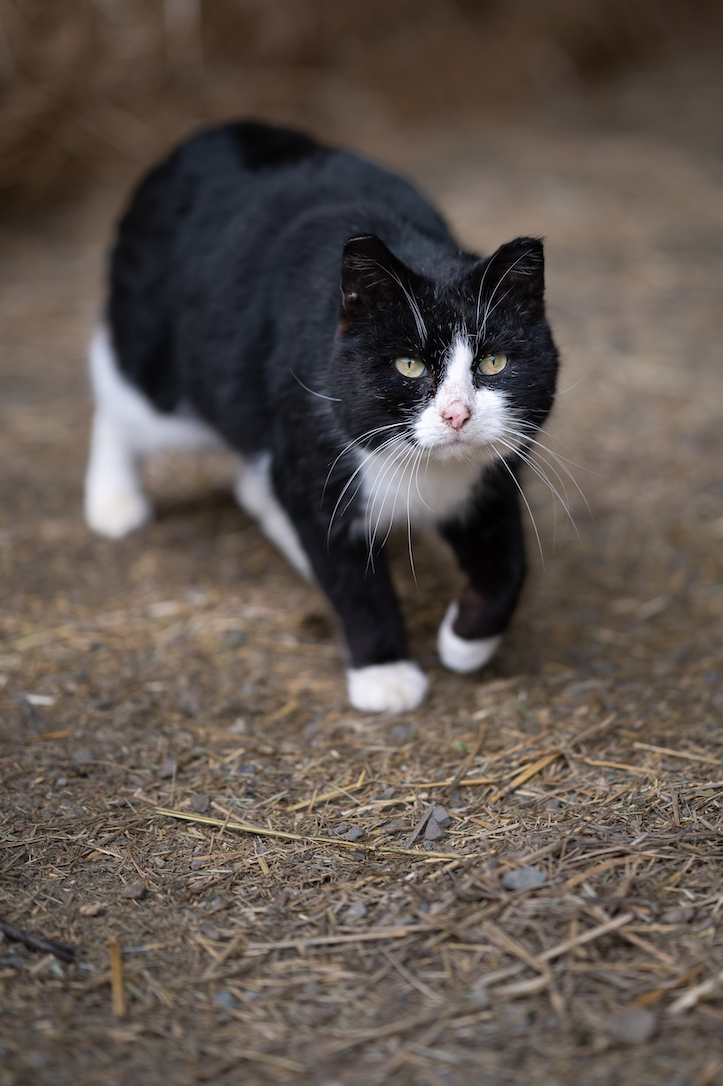
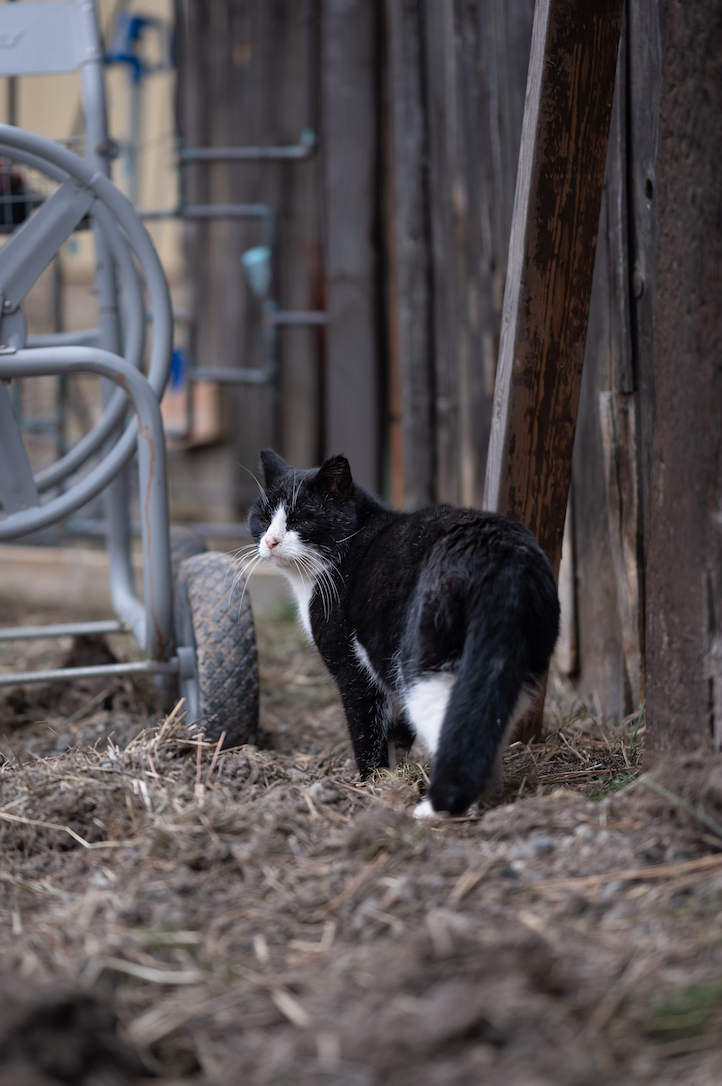
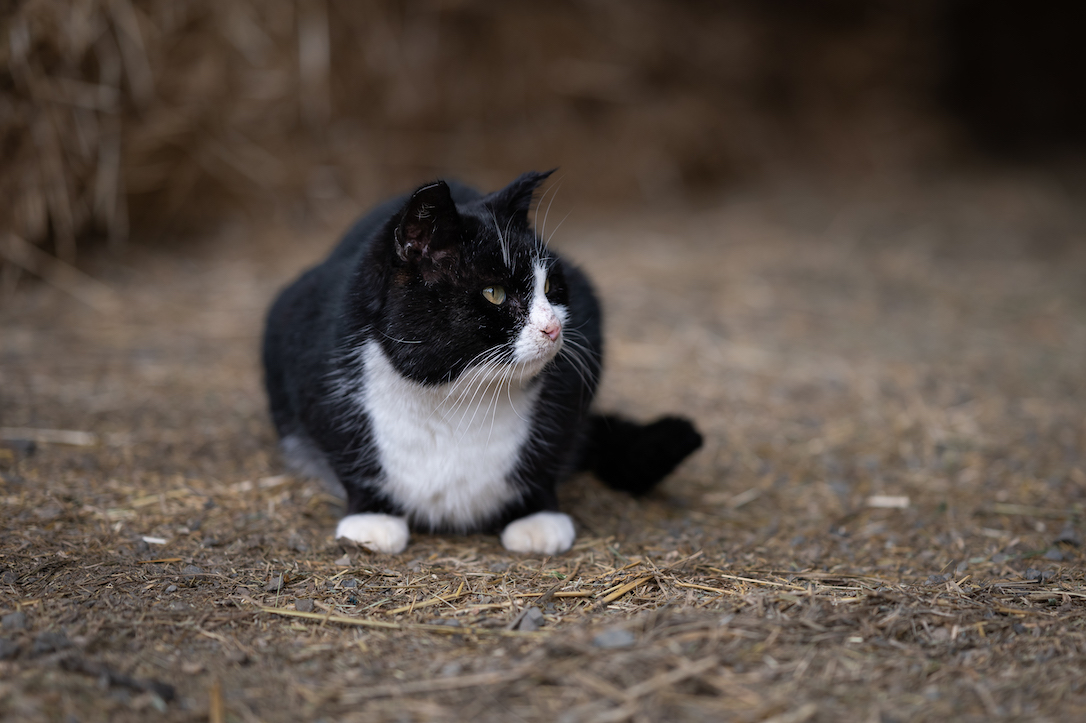
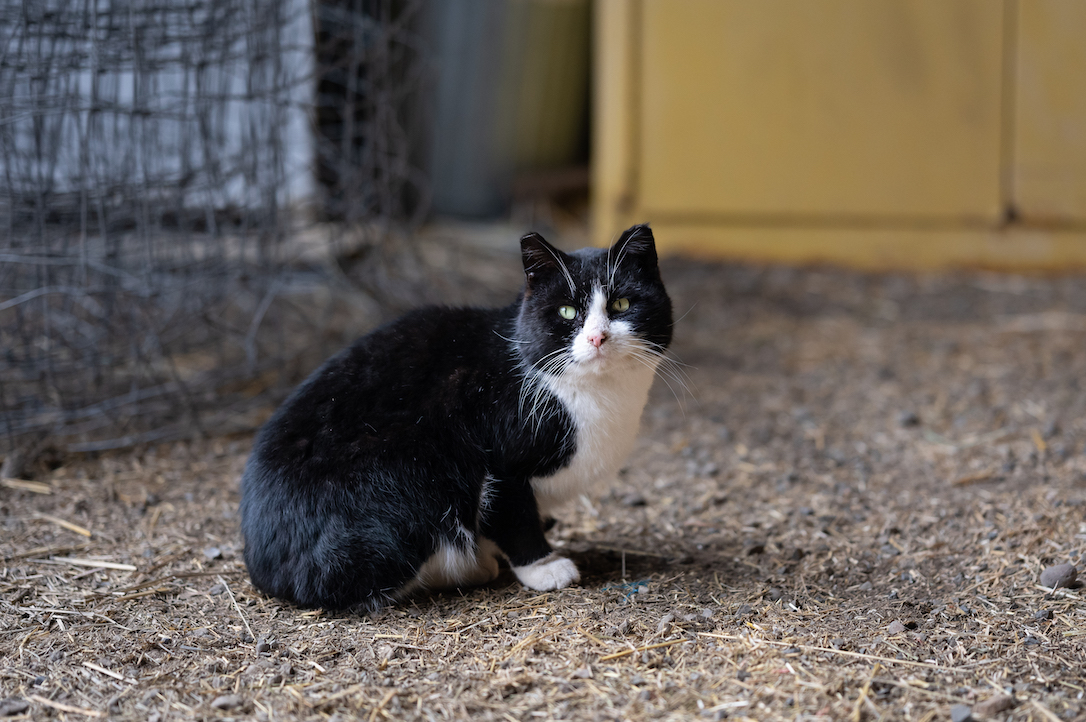
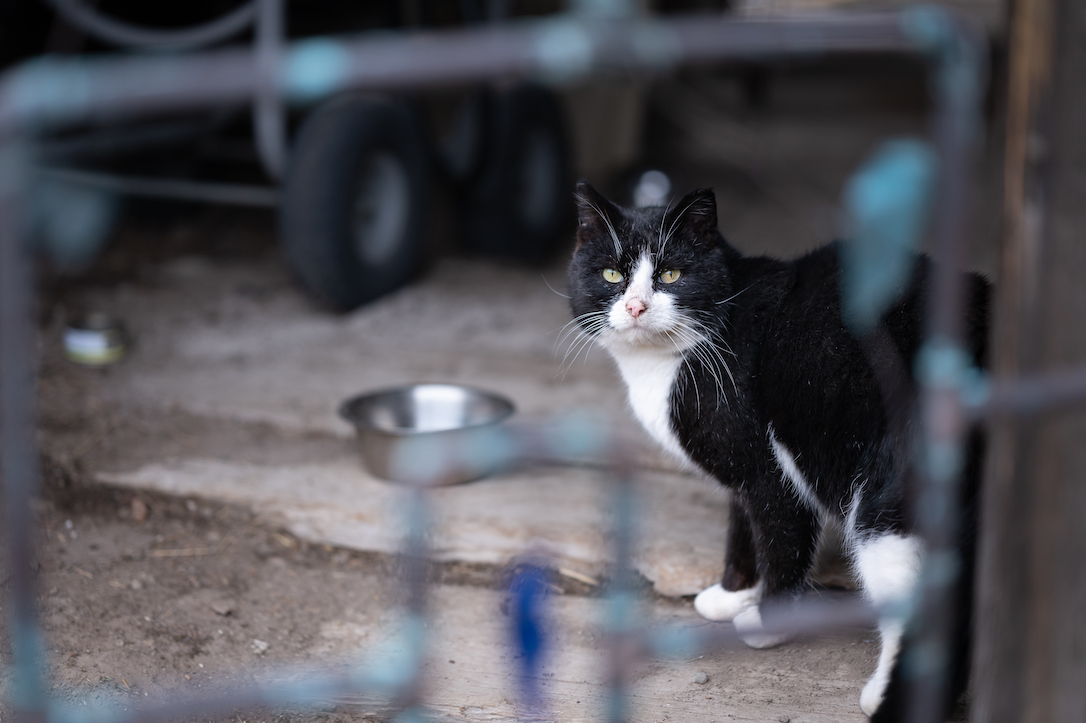





Referring to a cat as a killing machine seems a bit overkill in my opinion.
I agree. To be honest I found this whole blog entry very distressing.
As if cats don’t have enough adversity just trying to survive. :worried:
Actually, no, it is not. It is a fact.
From the American Bird Conservancy:
“Cats have contributed to the extinction of 63 species of birds, mammals, and reptiles in the wild and continue to adversely impact a wide variety of other species, including those at risk of extinction, such as the Piping Plover.
“The ecological dangers are so critical that the International Union for Conservation of Nature (IUCN) lists domestic cats as one of the world’s worst non-native invasive species.
“In the United States alone, outdoor cats kill approximately 2.4 billion birds every year. Although this number may seem unbelievable, it represents the combined impact of tens of millions of outdoor cats (feral and pet). Each outdoor cat plays a part.”
Neutering, spaying, vaccinating, and chipping your pet cat is not all you must do to be a responsible cat owner. Keeping it inside is, too.
I have been a cat owner many times over. If you cannot bear to keep yours inside, then reconsider whether you should have a cat.
And speaking of birds, the Smithsonian reports that window collisions (highrise to low-rise residential and commercial) kill between 365 million and 1 billion birds annually in the United States, with a median estimate of 599 million, although they (and other studies) believe the true number is in fact closer to 1 billion.
The only way to prevent this tragedy is to retrofit the window surface. which thankfully is not at all expensive.
The upshot is that the songbirds we love as well as all small animals get a really rough ride and our pet cats play a big part in that.
Mare and Reia, I appreciate the feedback and will consider your views in the future.
To clarify, my goal for the post was not to offend or distress but rather to highlight some critical nuances that may get glossed over in our other content (particularly any that shows Barn Kitty without explicitly describing his relationship to the sanctuary). The realities of our relationships with other species often make me uncomfortable, too, but I choose to tell those stories anyway. As with the chimps and cattle, providing context seemed like the responsible and transparent thing to do.
Right on, Andy. You covered the dilemma well. Cats are domesticated animals and should live inside. I have to agree that cats are killing machines. If you’ve ever fed birds, you’ve likely observed the machine-like nature of the outside cat—killkillkill. I’ve stopped feeding birds, who are just trying to survive. They’re no match for the inside/outside cat, especially. Those cats have food, water and comfy beds. Biodiversity!
Maybe “machine” is a bit much (I reserve that for sharks), but having had cats, I’ll say that most of us are aware that they will kill for sport, just because they can
…Admittedly maybe not the most palatable of metaphors on my part, but I do think the facts support that cats have evolved to be extremely effective predators.
Loved your photo shoot of Barn Kitty. We are definitely a cat household and all kitty articles are welcome. Our Sandy is 16-1/2 and lives a charmed life.
Thanks, Pat! It seems like you and Sandy are lucky to have each other!
BK looks to be a very handsome and well groomed predator. Please tell him…cats really do love compliments! As always, great photos. :heart_eyes:
Thanks, Anamaria! I’ll tell B.K. that he looks well-groomed. Admittedly, none of that is our doing and it’s all his own self-care!
what a great post!
I’m glad you appreciated it, Pamela!
Been around cats my entire life. When I was born there was a big yellow and white tomcat waiting to welcome me home and there have been countless others since then! Except for my early years on the farm, all of my ‘babies’ have been house cats. BK is beautiful and I wish for him a long and safe life at the sanctuary!
Thanks, Patricia! I am also a lifelong cat enthusiast, although I’m currently taking a break before adopting because I’m not home enough at the moment.
I’ll pass your kind words along to BK 🙂
Anthony, your mind is quite remarkable. The way you think and convey is a marvel. On top of that, add photography, and your stories light up. Your blogs are so informative and entertaining. I enjoy them so much.
Haha, that’s flattering, Paulette. I’m glad you liked the post! I try to inform and entertain but sometimes it’s hard to maintain a balance.
My cat, Miss Prissy, lives like Queen Elizabeth! Actually, even better. None of those annoying family members to upset her. She lives a calm and sedate life. She is 7 years old.
All those annoying family members!
That made me laugh. Thank you.
Glad you liked it! Thanks for letting me know.
Check out Sarah Millican’s advent calendar, which she showed before Christmas on the British show “8 out of 10 cats” :laughing:
Hahaha your comment about the Queen is appropriate. She has a very feline personality 🙂
Hahaha, does she end each day with prosecco and strawberries, with cake at tea time?! The Queen is a bit of a b-a!
Thank you so much for this well thought out article. The impact of domestic cats on fragile eco systems is often glossed over entirely, but it’s really dramatic!!! I love cats, don’t get me wrong, but I think a good solution for indoor cats whose owners want them to experience the “great outdoors” is to craft an outdoor catio, or other type of secure indoor/outdoor experience. One that allows the kitty to enjoy nature, but doesn’t kill innocent animals. Also, people who manage feral cat colonies are amazing and deep respect there. <3 TNR is the way to go!
Thanks, Thyra! I’m glad you liked the post. I’m also a big fan of catios, leash walks, and frequent play sessions for house cats- anything that helps them practice healthy feline behaviors!
Great article and pics. Glad you were able to TNR ‘BK’ and he can go about living his best life, whatever that is, and only he knows! He is very handsome – I have found over the years that there is something special about tuxedo boys, they definitely tug on my heart. Thanks for all you do for all God’s creatures that you come into contact with – some close up and long term and some fleeting and from a distance.
Thanks, Kathy! I also love tuxedos and would try harder to socialize him but I don’t think Barn Kitty is a big fan of my friendly advances. Like you said, sometimes we have to care from a distance so he can live his own best life. 🙂
B.K. is gorgeous – thanks for the stunning photos, as always Anthony.
I’m happy you liked the post, Judy!
Thank you, Anthony, for your exposition on people such as Barn Kitty (“Photogenically feral feline by day, Ecosystem-disrupting predator by night.”). Like Loulou in the office, there is no doubt that B.K. is a welcome addition to the population of the Sanctuary. Still, like the species who domesticated cats, their numbers have, indeed, tilted the balance of nature. Perhaps not as much as that monstrous primate species (8 billion and ever-fruitfully multiplying) who stand atop the food chain, but, as you noted, cats are not exactly vegan in their appetites.
In any event, your blog post today brought to mind the following loony-tune non-sequitor from the pen of Fast Freddy Nietzsche: “Man expects Woman to be peaceable, but she is essentially warlike, like the Cat.”
Thanks for the insightful reply, Tobin! LouLou and BK have very different lifestyles and dispositions so it’s mind-boggling to me that they’re the same species.
Also, I like the Nietzsche quote. 🙂
ok… who’s LouLou?
“Office kitty”
LouLou is a 22 year-old cat who lives with Diana and J.B. in the sanctuary house/office! She has a little outdoor yard but prefers to sit in human chairs. 🙂
Why should the chimps be the only enigmatic ones!? The only ones that make us think….”I wonder what they’re thinking/why they do that, etc”?
Anthony, I love that you’re one of a few people who can make me click on links out of curiosity, and there’s almost always 1 fun thing in there. I had seen that cat/drummer video in someone else’s vlog once, now it’s saved to my “happy!” list (short videos that just make me smile when I need to–I’ll bet you can guess who else is on there!)
For others who like cats, the space left by Li’l Bub’s passing, for me, has been somewhat filled by Nala, a kitten (now 3) found wandering the countryside of Bosnia alone by a burly, rugby-playing Scotsman who was cycling around the world. He meant to take her to a shelter in the next town to leave her there. But she’s still with him, has a passport, and may soon break the record for the most countries visited by a cat, all while perched on his shoulder or on/in the basket, as he cycles (channel is onebikeoneworld for those interested).
Glad Barn Kitty made it through the winter. He was probably hoping you’d disturb some mice while lifting those bales! And maybe Lulu is part of the attraction, too, right?
Linda C!
“I love that you’re one of a few people who can make me click on links out of curiosity, and there’s almost always 1 fun thing in there.” <------ This is perhaps the highest praise I have ever received. I'll think of you bravely clicking on mysterious hyperlinks the next time I embed one into a serious discussion. I'll have to look up the cyclist and his feline friend! That sounds like a cool account to follow. I don't know if BK has ever interacted with LouLou, although I suppose he is probably aware of her existence. If I had to guess, I'd bet that he is mostly motivated by hunting- the property has no shortage of vegetation and structures to support small critters- but I assume the food we regularly put out for him is also a major perk of visiting us. 🙂
Food works–it’s why my uncle’s barn cats migrated across the road to my grandparents’ years ago–Grampa built them a box to stay out of the cold, and Grandma would add leftover beggies, bread, and pan drippings to the dry food in the winter. And 2 of them (my 1st cat’s mom and grandmother) got to go inside when they wished, for braunschweiger and cheese!
I love traveling vicariously with Dean and Nala. He’s going from Italy to Spain atm, and sometimes he camps, sometimes he’s invited to stay in a castle or monastery! Since I haven’t been anywhere in 2 yrs, it’s great! He’s on IG, as well, but I’m not
oh, and he makes donations from the channel, his book, and merch to shelters that he visits as he cycles (helped one to rebuild, I think)
Cats are only ‘killing machines’ due to the irresponsibility of human beings. Therefore, I would say that human beings are killing machines, through negligence and thoughtlessness.
100% agree. Based on some of the responses, perhaps I should have been more clear that cats are more emotionally complex than mere machines and that’s an oversight on my part. Still, humans (and the organisms we carry with us in one capacity or another) have a tremendous effect on the ecosystems we live in. I believe it’s our duty to reflect on those relationships and adjust our behavior when such changes are appropriate and feasible.
Vicky: You are absolutely correct, the greedy human species will destroy our beautiful plant Earth in the near future. What a tragedy!
Lucky Kitty! Love to peek inside his mind when he sees the chimps 🙂
Me too, Debbie!
….as you can see Anthony you’ve got a lot of cat lovers here :hugging:….I agree with Vicky….. I’ve done TNR and I’ve seen it all…my heart bleeds for them
…..I’m so happy you care for him and give him the best ……as he gets older I’m sure he’ll be a regular …how beautiful he is?
Thanks, Marie!
Thanks for the great blog today Anthony,
It’s hard to know what the “right” thing to do about outdoor kitties is, there doesn’t seem to be one answer to fit every situation, and sometimes we just need to think about what’s best for each individual. Barn Kitty seems happy and that means a lot. He’s also really cute ! My earliest baby pictures are all of me and my Gramdma’s Cat, who was a dead ringer for B.K. named Frisky. I swear, it looks as if my Mom came home with me and just gave me to the cat.
Actually, that might explain alot about me.:smiley_cat:
Thanks, CeeCee! Frisky sounds like they were a great companion! 🙂
A few weeks ago I adopted a bonded pair of adult cats. One is a gigantic male cuddle bunny, and the other a tiny, feral female. Both were captured by animal control and have been in foster care for 5 years. Initially the female was recommended as a barn cat candidate, but she has become inseperable from the big guy so they were adopted out together, and they now live in my guest room.
I have learned so much reading your blog that I now look at these cats in a totally different light than I’ve looked at all the other cats I’ve known (there have been a lot!) I let them be themselves, I meet them where they are, I let them take the lead with what makes them comfortable or not. I ponder enrichment – I wish cats liked raisin boards, I feel I could excel at making those! Mostly I realize that they have each other, and that is the most important thing.
Look up cat enrichment online. Lots of ideas.
Absolutely. cats in a pair is best. If you or a friend, partner is handy, there are many catio plans available online. I wish they’d been a thing when I was growing up with our 6 cats!
Yes!!! All the cat people I know support catios, frequent play, and social enrichment (if you have a social cat)!
BK is so handsome in his tuxedo!! Thank you for the photos and the Barn Cat’s story. I’m glad you were able to fix his leg and neuter him at the same time. You told some interesting facts, some hard to read, some fun, and some I didn’t really want to know about. But you did a good job writing about ferel cats, checking into their background and the other animals involved. Thank you for the photos. You had a very photogenic subject.
Thank you, Jeani! I agree that he is photogenic and handsome, in a scruffy renegade sort of way… like a feline Han Solo?
Does Barn Kitty choose to hangout in the barn only? I am curious if he ever patrols alongside of Jamie and friends — on the human side of the fecning of course. One thing is for sure, Barn Kitty looks well fed! He’s very handsome. And a big “Thank you” to Dr. Erin and Sofia for tending to his wounds and seeing to it that was neutered. Looks as if ol’ B.K. chose the right barn to settle in. 😉
Hey Kathleen! He definitely roams all the areas outside of the chimp fences, but I don’t think any of us have observed him to notice or interact with the chimpanzees. I’m sure he’s aware of their presence but have no idea how he perceives them. It’s a cool question. 🙂